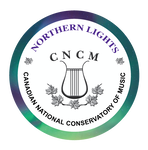Theory
Programs/Exams > Theory
The Northern Lights Canadian National Conservatory of Music offers a complete rudiment, harmony, counterpoint and analysis program. (See Harmony for harmony, counterpoint and analysis information)
Rudiment Program
CNCM has created a rudiment program which develops basic information ands builds to a elementary harmony in four examinations.
-
Grade 5 Theory
-
Grade 6 Theory
-
Grade 7 Theory
-
Grade 8 Theory
<
>
Grade Five Theory
Co-requisite for Grade Five Practical Examinations
Examination Length: 1.5 Hours
Grade Five Theory topics include:
Examination Length: 1.5 Hours
Grade Five Theory topics include:
- All major and minor keys up to and including four sharps and flats;
- Tones and semi-tones;
- Treble and bass clef;
- Tonic, sub-dominant and dominant triads;
- Accidentals (sharps, flats, naturals);
- Major, minor and perfect intervals within the octave;
- Simple time signatures;
- Transposition at the octave;
- Simple melody writing;
- Correction of errors;
- Identification of the Acciaccatura;
- Simple analysis; and
- Italian terms and musical signs
Grade 6 Theory
Co-requisite for Grade Six Practical Examinations
Examination Length: 2 Hours
Grade Six Theory topics include:
Examination Length: 2 Hours
Grade Six Theory topics include:
- All major and minor keys;
- Accidentals (sharps, flats, naturals, double sharps, double flats);
- Identification of blues, pentatonic, whole tone, octatonic and chromatic scales;
- Treble and bass clef;
- Simple and compound metre;
- All intervals within the octave and inversions;
- Major and minor chords with inversions in close and open position;
- Technical names of the degrees of the scale;
- Perfect and plagal cadences in keyboard style;
- Upward transposition from major to major keys; correction of errors;
- Identification of the Acciaccatura and trill;
- Analysis;
- Melody writing with cadence points; and
- Italian terms and musical signs
Grade 7 Theory
Co-requisite for Grade Seven Practical Examinations
Examination Length: 2 Hours
Grade Seven Theory Topics include:
Examination Length: 2 Hours
Grade Seven Theory Topics include:
- All major and minor keys (scales beginning on any degree of the scale);
- Writing of blues, pentatonic, whole tone, octatonic, and chromatic scales;
- Treble, bass and alto clef;
- Simple and compound metre;
- All intervals within the octave and inversions;
- Enharmonic equivalents;
- Major, minor, augmented and diminished triads, dominant seventh chords with inversions in close and open position;
- Identification of diminished sevenths chords in root position;
- Analysis of a chorale passage using Roman Numerals for identification;
- Perfect, plagal and imperfect cadences in keyboard and chorale style;
- Upward and downward transposition using major and minor keys;
- Correction of errors;
- Identification of the Acciaccatura, trill, Appoggiatura, and mordent;
- Analysis;
- Melody writing with cadence points;
- Identification of unaccented passing notes; and
- Italian terms and musical signs
Grade 8 Theory
Co-requisite for Grade Eight Practical Examinations
Examination Length: 2.5 Hours
Grade Eight Theory topics include:
Examination Length: 2.5 Hours
Grade Eight Theory topics include:
- All major and minor keys ( scales beginning on any degree);
- Writing of blues, pentatonic, whole tone, octatonic, and chromatic scales;
- Simple, compound and irregular metre;
- Treble, bass, alto and tenor clef;
- Ionian, Dorian, Phrygian, Lydian, Mixolydian, Aeolian and Locrian modes;
- All intervals and inversions, including compound intervals;
- Major, minor, augmented and diminished triads, dominant seventh and diminished seventh chords with inversions;
- Identification of quartal chords, polychords, clusters and bi-tonal chords;
- Writing of simple chorale passages using figured bass analysis;
- Perfect, plagal, imperfect and deceptive/interrupted cadences in chorale or keyboard style;
- Transposition using major and minors keys and for instrumental writing;
- Realization of the Acciaccatura;
- Trill;
- Appoggiatura;
- Mordent;
- Open scores (vocal and string quartet);
- Analysis;
- Melody writing with cadences;
- Passing notes and auxiliary notes; and
- Italian, French and German terms and musical signs
Theory Syllabus
Download a free copy of the Theory/History Syllabus
| theory-history_syllabus_2012.pdf | |
| File Size: | 359 kb |
| File Type: | |
| Theory Grade 5 Sample Papers | |
| File Size: | 4931 kb |
| File Type: | |
| Theory Grade 6 Sample Papers | |
| File Size: | 5964 kb |
| File Type: | |
| Theory Grade 7 Sample Papers | |
| File Size: | 5648 kb |
| File Type: | |
| Theory Grade 8 Sample Papers | |
| File Size: | 2019 kb |
| File Type: | |
Copyright © 2002-2022 CNCM

